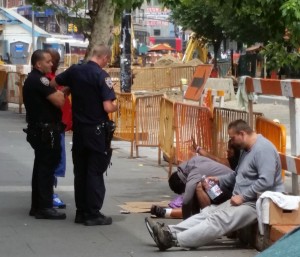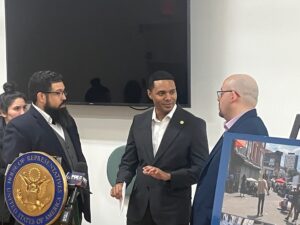At a gathering of health care providers at Lincoln Hospital in February 2018, Lincoln’s then-CEO Milton Nuñez somberly suggested that Mott Haven was “ground zero” in New York City’s uphill battle to control opioid abuse.
Seven years later, it appears the only thing that has changed is that the drugs available on the street are more lethal than ever.
At a press conference in The Hub earlier this week, Rep. Ritchie Torres pushed for changes in the law that would include mandating mental health treatment for people with severe mental illness who refuse treatment. He accused Gov. Kathy Hochul and Mayor Eric Adams of sitting idly by while repeat offenders who should be taken off the streets are “gaming the system” and the mentally ill elude needed treatment that, if they received it, would make the streets safer.
City and state officials should “permanently dismantle every open air drug market in New York, especially here in the Bronx,” he said, to stop people from casually shooting up in crowded venues like Roberto Clemente Plaza in The Hub “in broad daylight,” causing “a deepening rot at the commercial core of the South Bronx.”
Torres has been sounding the alarm about drug use around The Hub for months. In September, he sent a letter asking the mayor to “coordinate a robust interagency response, featuring the NYPD and DOHMH, aimed at permanently dismantling the open-air drug market that has cast a cloud over the health and safety of the South Bronx.”
Advocates for the homeless, however, say calls by elected officials for mandated treatment are misguided.
“Proposals to expand involuntary psychiatric treatment powers misdiagnose the real crisis,” said the director of the city’s Coalition for the Homeless, David Giffen in a statement to The Herald. Existing laws already provide a “legal framework for intervention when it is actually needed. The fundamental issue has never been a lack of legal authority – it is the severe shortage of permanent affordable and supportive housing and accessible community-based mental health services.
“Rather than pursuing expanded powers that could violate civil rights,” Giffen said, “We urge Representative Torres and other elected officials to address the actual barriers to mental health care: chronic underfunding of supportive housing and mental health infrastructure.”
Standing alongside leaders of the Third Avenue and Southern Boulevard Business Improvement Districts at the BID’s E. 148th Street office, Torres said the random stabbing of 14-year-old Caleb Rios on East 138th Street by a mentally ill repeat offender earlier this month is the fault of a porous justice system. The suspected murderer had been released on his own recognizance despite multiple recent arrests.

Javier Medina, executive director of the Southern Boulevard Business Improvement District, said he and his staff have reversed more than 200 drug overdoses as they were happening on South Bronx streets, adding that is not the traditional role of the city’s BIDs, which are tasked with keeping the streets clean. However, in carrying out their professional tasks, Medina said, they get to know many of the homeless people and drug users who spend their time in public areas.
“I’ve been here my entire life and it’s only getting worse,” said Medina. “The drugs are getting much more dangerous,” so that “a lot of the solutions, like Narcan, no longer work (in all cases).”
Police officers lack the training to resolve confrontations with people on the street having mental heath episodes, he added.
“We have a small amount of deescalation training but we don’t have mental health training,” he said. “We need people out there who can do that.”

Third Avenue BID director Pedro Suarez said a a task force in The Hub is needed, combining the sanitation and health departments, NYPD, health care providers and community groups, to monitor the areas where drugs are used openly. The group would “identify individuals who are out there every day,” refusing service while presenting a risk to themselves and others.
Last week Mayor Adams announced a $650 million program to treat severe mental illness through NYC Health + Hospitals, with a “home-like environment to patients with serious mental illness who are ready for discharge from the hospital but do not have a place to go.” That would reduce homelessness and reliance on shelters, and less criminal justice intervention, the mayor said.
But despite those plans, the mayor las week also announced plans for a 2,200 bed shelter at 825 East 141st Street, adjacent to the Bruckner Expressway, despite local leaders’ long held contention that The Hub is “ground zero.”

